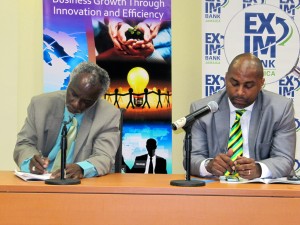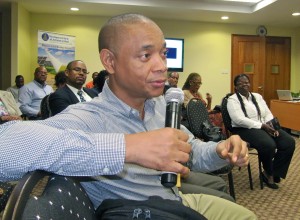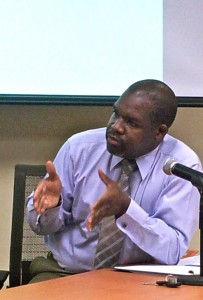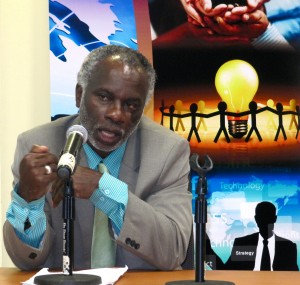
Getting on the Highway – With the Right Mindset
February 4th, 2015
We hear a lot about highways, these days. They are the answer to all our economic problems. They bring growth and development. When I see photographs of the wide open spaces of the new North-South Highway, with hardly a car in sight, I do question this. But that’s another story.
Last week, I attended a very well-organized and tightly-timed Round Table Talk produced by Katalyxt Jamaica on the topic: “Using Technology to Create New Opportunities to Drive Growth.” The highway that State Minister in the Ministry of Science, Technology, Energy and Mining Julian Robinson was speaking of was, of course, the broadband highway. But it seems to me that it is more of a fast-moving conveyor belt. You have to be quick to jump on it, and I still get the feeling Jamaica is not moving fast enough. Yes, a certain section of the population is on and moving along quite nicely; the majority of Jamaicans can’t get a handle on it, at all.

Financial analyst Ralston Hyman (left) takes notes the old-fashioned way, while Minister Julian Robinson is on his smartphone. (My photo)
I didn’t get a chance to ask about the so-called “digital divide,” and the discussion did not really lean in that direction. Minister Robinson gave a brief overview of his Ministry’s progress; with financial assistance from various quarters, quite a lot is getting done. Minister Robinson stressed the importance of the “tablets in schools” program (there are now 25,000 out there) as being a much more cost-effective and efficient way of educating children, allowing them to at least put a foot on the highway. The ongoing e-Learning project, he noted, has set up 200 computer labs. But in the average high school with a population of at least 1,000, each student would get a maximum of one hour per week on a computer at school. This rather begs the question as to whether expensive computer labs (also a security risk for the school and high on maintenance costs) are a worthwhile investment at all. I wonder how many are in full use, too.
Minister Robinson also spoke of over 200 “community access points” island-wide as part of the expansion of a broadband network to hospitals, post offices and soon to police stations. Yes, great – so long as employees don’t spend their time posting on their Facebook account and sharing YouTube videos. The Minister was surprisingly frank about the progress of many government projects, which he said are “running way behind.” For him, technology in the public sector equals greater efficiency. The purpose of the e-Government project is to improve matters, cut wasted time and money (the government, he said, has spent US$8 million on government-to-government phone calls, instead of using free platforms such as Skype).
Because, let us face it. Fundamentally, the “growth” mentioned in the topic under discussion depends on productivity. Jamaica, as one of the Minister’s co-panelists Ralston Hyman remarked, is neither productive nor competitive right now. Jamaica, Hyman suggested, must embrace much more research and development, training and the application of science and technology in different spheres of national life. There is no doubt technology in a broader sense has impacted the global economy, he noted. Fracking, for example, has brought the price of oil down to stunningly low levels, impacting every nation for better or worse. But let’s bring it back to our small island. Hyman is concerned about our indulgence in “rent-seeking behavior.” I confess I had to look this term up when I got home. A useful definition I found online is: “When a company, organization or individual uses their resources to obtain an economic gain from others without reciprocating any benefits back to society through wealth creation.” That figures, doesn’t it. A greedy, selfish mindset that does not serve the national interest in any way.
Senior lecturer and Director of the Mona GeoInformatics Institute of the University of the West Indies (also Jamaica’s latest Eisenhower Fellow) Parris Lyew-Ayee talked about the “non-tech part of tech.” He described an “ecosystem” linking people and building a global community of business. Here is where small and medium-sized enterprises (SMEs) could jump in on the highway; Hyman insisted that these are the true “engines of growth.” The JN Foundation’s Social Enterprise Boost Initiative funded by USAID comes to mind.
By the way, I asked the all-male panel (which also included Senior Trade Analyst at Exim Bank Jerome Newton) about the involvement of women in science and technology. At which point Katalyxt reminded me that founder and CEO is a woman! Nevertheless, I persisted, I have noted at IT booster sessions and youth competitions that around eighty per cent of participants are young men. Are girls being encouraged to go into Science, Technology, Engineering and Mathematics (STEM) subjects? Minister Robinson swiftly replied that the Government has partnered with a UK-based program called “Girls Who Code,” which trains young women in “hard IT areas.” Well, that’s a start. I believe the Education Minister is keen on STEM, too.
By the way, Minister Robinson, when discussing “inefficiencies” in the current operations of Jamaica Customs (soon to be fully computerized) refused to actually utter the “C” word – corruption. He made rather a performance out of skirting it, while the audience made small, ironic noises. Let’s acknowledge that it is often part of the Jamaican way of doing things.

PSOJ Executive Director Dennis Chung asked the question: Where can the greatest improvements come that we could tackle first? (My photo)
Which brings me back to the point I made earlier: It takes the right mindset. For a small island like Jamaica, technology is but a tool (“a great enabler,” as the Minister described it) – not an end in itself. The Private Sector Organization of Jamaica’s Dennis Chung put his finger on it: Yes, he observed, technology looks good and it is great to acquire a highly efficient new system for your government department or business. But if the “processes and rules” are not ready, then what good is it?
And there are no magic bullets for Jamaica’s economy. It just takes hard work. I repeat, Jamaica has started on that highway… But it has a long, long way to go.
What is Katalyxt Jamaica? It’s a business development organization offering training, an SME incubator program and business events, including a Youth Innovators Competition, which we will hear more about soon. This year’s conference, scheduled for May 21, 2015, will focus on agriculture. You can read Katalyxt’s latest e-zine here: http://issuu.com/katalyxt/docs/ekatalyxt_final__1_
You can contact them at 12 Kingslyn Avenue, Kingston 10. Tel: 968 3115. email: katalyxt@gmail.com. Also on Facebook and Twitter @katalyxtja
Tags: Dennis Chung, Energy and Mining, entrepreneurs, Exim Bank, information technology, Jerome Newton, Julian Robinson, Katalyxt Jamaica, Ministry of Science, Parris Lyew-Ayee, Private Sector Organization of Jamaica, Ralston Hyman, small and medium-sized enterprises, STEM, Technology, USAID
The Gleaner reserves the right not to publish comments that may be deemed libelous, derogatory or indecent.
To respond to The Gleaner please use the feedback form.
2 Responses to “Getting on the Highway – With the Right Mindset”
- We Are the Zoomers
- Living Online with Humans and Birds: NAOC 2020
- Human Trafficking and the Problem of Public Education
- Down Memory Lane
- Are We Ready to Recover from COVID-19?
- Road Safety Matters: Is Your Vehicle Safe?
- Sexual Harassment, Me Too, and the Minister’s Disturbing Giggle
- The Vulnerable Senior Citizens, Private Care Homes and COVID-19
- A Muddle Over Masks
- Here is Something Life-Saving You Can Do: Give Blood!







Emma Lewis always brings information that no one else delivers about national issues that matter. Thanks for this article.
Thank you so much for your comment, Barbara! It is much appreciated.